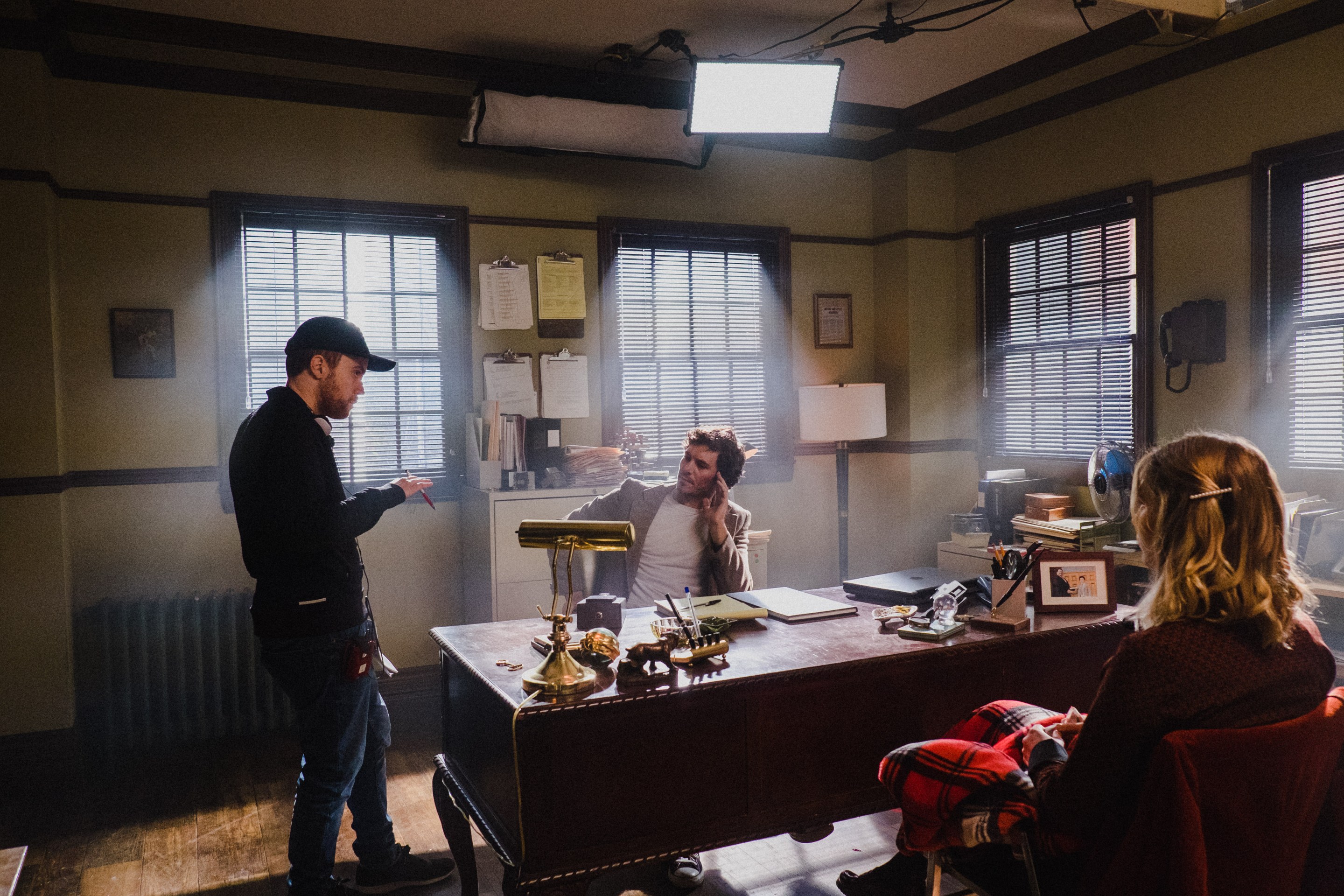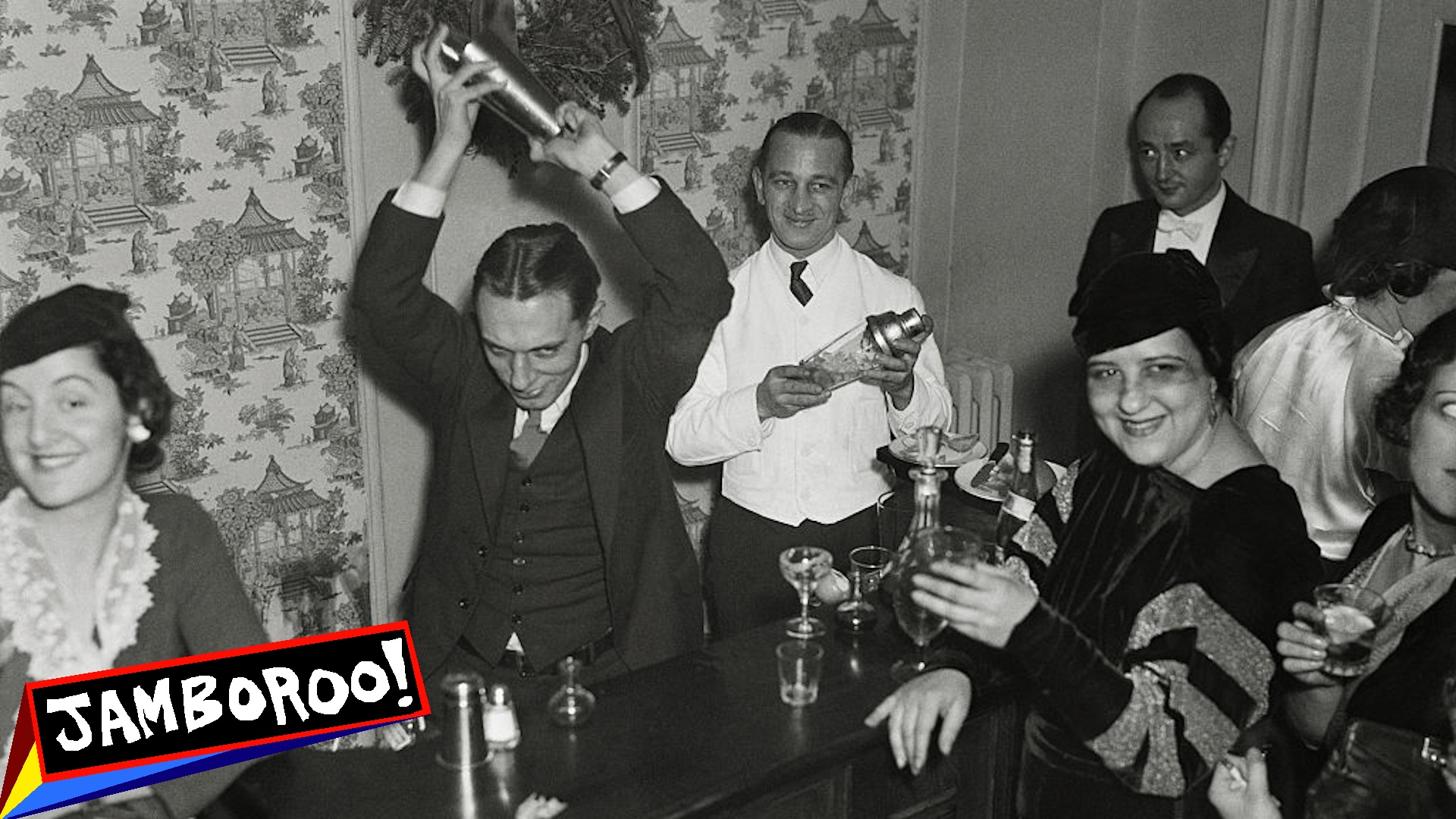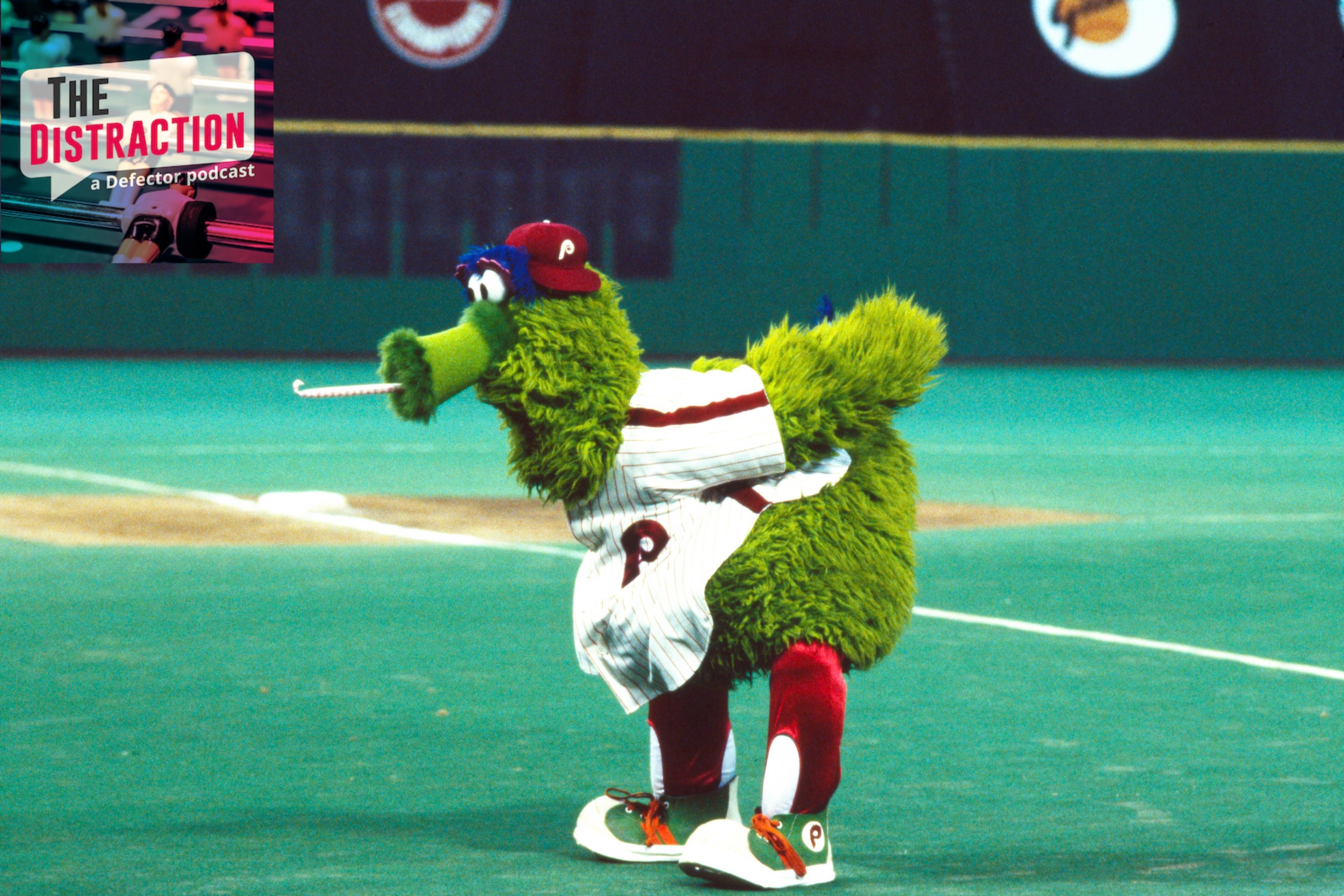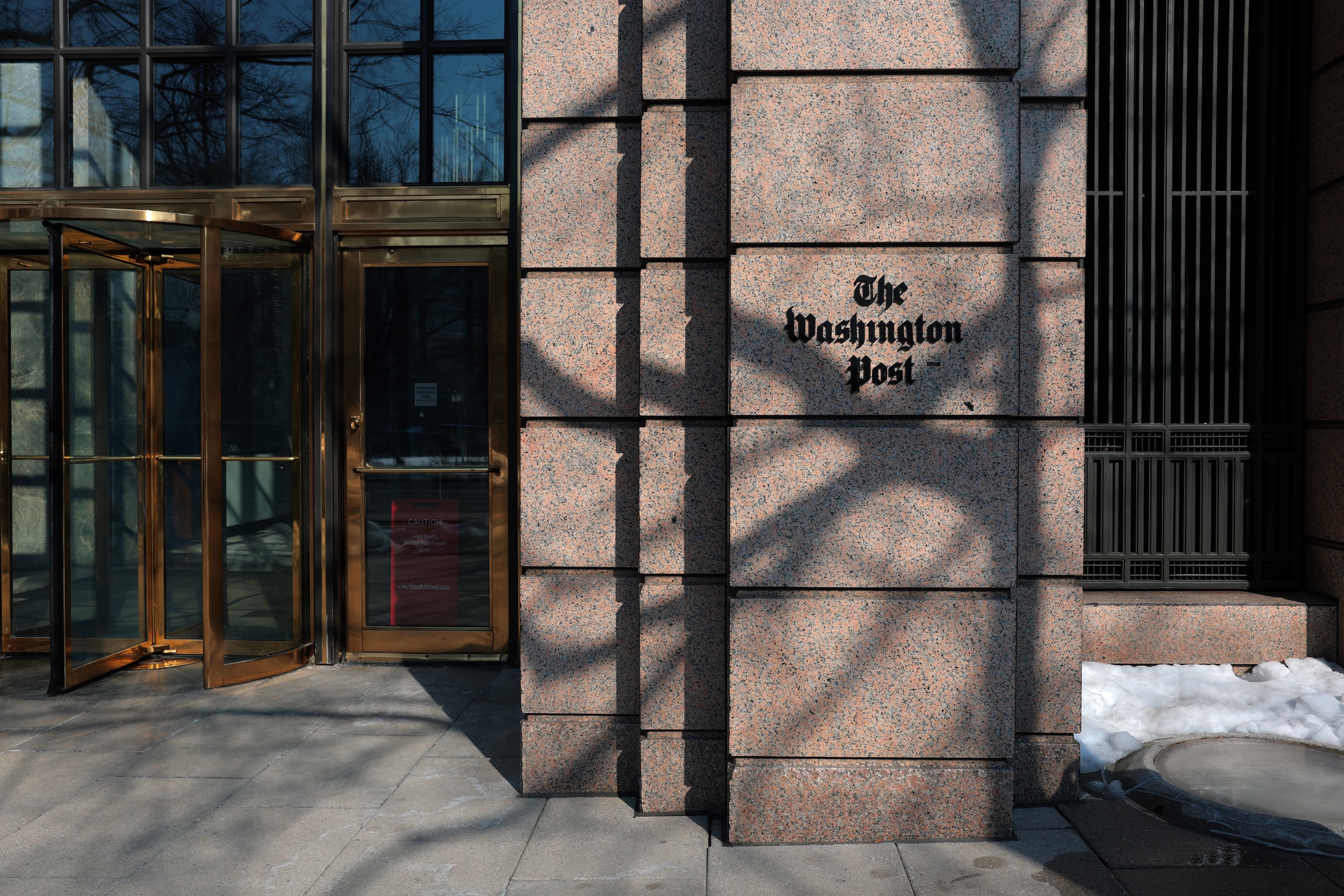I was not expecting to dive into the case of The Kid Detective. I wasn’t even aware there was one. All I knew was that I had never heard of the film until February 2021 (three months after its release on Nov. 6 in Canada, having come out first on Oct. 16 in the U.S.), which was maybe not so strange given the ongoing pandemic. The hard-boiled poster—star Adam Brody nursing a drink, co-star Sophie Nélisse wide eyed with shock—was slightly familiar. I just thought it was some minor straight-to-video release, which didn’t seem such a reach considering its former teen star, a demographic often relegated to that ilk of film. Then I started seeing critic after critic saying that, actually, it’s fucking awesome. So I watched it, and watched it again, and it is now probably my favorite Canadian movie ever. There’s something so quintessentially local about this little neo-noir that makes it not just quaint, but irresistible.
It’s pretty simple at first glance: a once-celebrated Nancy Drew-type named Abe Applebaum (Brody) fails to solve the most important mystery of his youth, and 20 years later is a washed up has-been. But then a teenager (Nélisse) brings him a murder case with which he might reclaim his old glory. Right before the film’s title appears, Telefilm Canada flashes on the screen, but anyone around here could have sniffed that out without the signpost. The Kid Detective feels just contained enough that the budget implies Canadian money, but it stretches out leisurely within those confines. It has that suburban quality of fringe Ontario towns (it was filmed in North Bay) and it is heightened like genre films are, but conservatively, like the good Canadian it is.
Still, people have trouble categorizing The Kid Detective. Is it noir? Is it comedy? Is it drama? Is it a thriller? It opens on a scene which reminded me somewhat of Halloween but also of David Lynch. “Sugar Town,” a Nancy Sinatra bop, plays over an idyllic, tree-lined neighborhood, through which a 14-year-old girl walks in her bobby soxy outfit, only for you to notice a dark car following her. Her tentative wave suggests she might know who is behind the wheel, and suddenly she is disappearing out of the left side of the frame. She is gone. Then the film itself suddenly takes a left turn into a modern day indie about a stunted 32-year-old—in an associatively deflated version of his formerly idyllic town—whose parents still bring him groceries and who is too old to be sleeping in (a cute recurring theme is that Abe can never get the day right). “I used to be loved,” Abe’s voice-over says. “I used to be a kid detective.” Even that line reads wry, like it’s laughing at itself.
Writer and director Evan Morgan approached Brody at the Toronto International Film Festival (he had snuck into a party) to be in this film, his feature directorial debut, before he even had a script. The initial idea was a kid who solves “grisly crimes,” Morgan told me. This was 2012, five years after The O.C. had concluded, before Brody returned to the screen in various supporting roles as a kind of aged, sardonic version of Seth Cohen, the high-schooler who made him famous. He was in that liminal space, a teen heartthrob adrift. Brody kept in touch while Morgan completed the script. The mystery was “the most intimidating part,” Morgan says, so he read Raymond Chandler and Encyclopedia Brown. He wrote one mystery and scrapped it after six months. He was inspired by Chinatown and L.A. Confidential and wanted the detective to be “a fish out of water” in Los Angeles. When he brought what he had to Brody, who is also an executive producer on the film, he received a crucial note. “You’ve got this town as a character unto itself,” Brody told Morgan. “And that’s where the story should take place.”
Once the script was complete, it took four and a half years to get it made. The Kid Detective had a good amount of time to shoot for a Canadian indie (26 days), but a tight budget (a little under $3 million) for the number of locations and the size of the cast. By the time it went into production, Brody was 39, slightly too old for the 32-year-old character. But that slight offness works. It’s what helps give the film that Canadian quality. The same way its sense of humor is deadpan in a way that is not quite American, not quite British—a kind of untroubled wit beneath which a darkness roils.
I didn’t mean to do a Q&A with the man behind The Kid Detective, but it’s apt for a piece about a film that breaks expectations at every turn for that to happen here. My comment that more people should know about The Kid Detective, which was meant to be a compliment, inadvertently tapped into Morgan’s complicated feelings around its release. We ended up talking for over an hour, and I thought I would include our chat here in the spirit of sleuthing. (The conversation has been edited for space and clarity.)
This is a tonally challenging film. How did you end up balancing it?
It came down to the comedic meter. The moment that it started feeling a little overlong or that dialogue scenes felt like they weren’t hitting at the right tempo, everything became ambiguous in terms of the tone and in terms of whether this was a comedy or drama or whatever. Whatever precision worked on the page, in terms of people really calibrating and understanding the comedic logic, the dramatic possibility of the script, that was not working in the most literal version of the edit when the script assembled on screen. In order to find it, we had to tighten it and lose scenes. There was a scene in the script, which is a two-page or three-page scene of Abe starting an email and deleting it and starting it over and deleting it and starting it over and deleting it for people that he met at a bar the night before. The producers were like, You’re gonna delete the scene. And I was like, No, I’m not, people love this scene. For me, it was like, Oh, that is an opportunity for the audience to recognize themselves within this character, which I thought was important, because he does a lot of selfish things. He’s not the most likable character, necessarily. And so there were things like that, that I thought probably were really helpful for people reading the script that actually were extremely unhelpful when people were watching the movie.
Did you ever worry about going too dark?
While we were prepping, it was really a question of how big is this performance [of Brody’s] going to be? And my theory the whole way through was like, No, it can’t be overtly comedic. It can’t become a caricature, it has to feel grounded because of where this movie ends. Adam, conversely, was like, But it has to be funny. If it doesn't work as a comedy, it's not going to work at all. And I think he’s right. His first instinct was he wanted to go larger with it. He wanted to play it a little bigger with a little bit more inflation and a little more energy. And I was directing him down. He specifically told me that in his 20 years of acting, it was the most anyone had ever toned him down. When he made that comment, that worried me.
But what ultimately we discovered was that the truth was somewhere in between. So I did end up going back through the footage to find those variations, those things that Adam gave me, typically on the first couple takes. He was like, Okay, I see your point, just give me the first two takes on each setup. For example, there’s the scene in the diner, where he’s eating a sandwich. This is the moment where he takes his first bite, and there’s a little lettuce left and he slurps it up into his mouth. That’s something that I found in footage when I was desperate for some variation. There were enough little things that I could find that it was able to work as both a comedy from scene to scene and not feel like it entirely betrayed itself by the time it arrives at its inclusion.
I like that Adam Brody is a little too old for the 32 he is given.
I started writing the script in my late 20s and I really wanted the character to be in his late 20s, because so much of what I was doing was really just drawn from my own life – the fact that my parents were still bringing me groceries and that type of dynamic. As time went by, and the production kept getting delayed, [Brody] was like, Can you please make the character older? So I let him be 29 and then I let him be 30. In each new draft of the script, he would be a tiny bit older. At a certain point, I drew a line. I was like, now he’s 32. Because I wasn’t sure at what point he becomes a little too hopeless. I thought, if that character is 40, then basically he’s like the Dude. It doesn't feel like he’s fallen behind, it feels like he’s completely fallen off.
Was there any improvisation? I feel like Brody would be good at that.
The cadence is so particular and the tone is so particular, I don’t think there’s a single improvised line in the whole movie. So much of it is trying to get everybody on exactly the same frequency, which is tough to do with any elevated film that isn’t set in a realistic space. All the scripts that I write, they’re all set in this somewhat elevated space. The sense of humor that exists in Detective pervades everything that I’ve ever done. But I don’t have the advantage of being able to point to three other movies to be like, That’s what we’re doing. So it really came down to finding the people that really understood the humor of it and just making sure that everybody was a character of the same universe. For that reason everything was very deliberate.
How did you decide on North Bay, Ontario, for the town?
I didn’t want this to be explicitly situated geographically. I wanted it to exist like in literature, not in an actual real place, in an imagined place. I didn’t want to see a body of water, which we ultimately do. I was like, No, we can’t see a body of water! I don’t want people to know that it’s near a lake! I didn’t want people to be thinking: Is this Canadian? Is this American? I did something really silly because I wasn’t thinking that anyone was going to be able to read the detail on the screen but there’s a hodgepodge like when he does the ego boosters, he snorts it through an American dollar bill, but when when he’s in the tree house accepting cases, they’re Canadian quarters. And the license plates are Ontario plates.
The music, by Jay McCarrol, really makes some of the scenes in this film –particularly the big clue reveal. How did that develop?
So Jay is actually an old friend of mine. We were living together when I was writing this movie. He sent me a lot of sample stuff before I’d even told him he got the gig. It was at the time when he hadn’t really scored features. I always knew how talented he was, but because this was my first feature on that scale, I was like, Do I need to find the most seasoned veterans available? I ended up doing the opposite. I worked with a lot of my friends on this and it turned out to be the best thing that could have possibly happened. Jay gave me everything that he had – he gave me mountains of work and was determined to get it right – which I know is not the standard practice. (When you’re working with a composer, you get, like, three passes.) But it was tough, it took a lot of false starts – much like when I was writing the script – to really find the right themes. What we always talked about was, if you just do it straight up noir or it’s too moody or too brassy, does it then feel like a spoof and then diminish the stakes of the story? At the same time, there has to be an element of that that is fairly predominant, because otherwise it’s just random mood music that just sits on top of the film, which might assist with it emotionally, but doesn’t really have any relationship to the genre.
Because it took so long to get financing, Brody suggested turning the film into a television series. Why didn't you go that route?
A lot of it was sunken costs, having already spent the better part of five years working on this as a feature film and believing in it as a feature film, not wanting to pry the script open again, to convolute it or come up with more characters just for the sake of extending it. I just didn’t see how that was going to add to the potency of it – it felt like work that I wouldn’t be excited to do. So every time that he brought it up as a pragmatic option, it was just uninspiring to me. But I understood where he was coming from. Obviously that was where the money was, and Adam is most known for his television work. There were a lot of things that I think would have come together probably a lot faster had we done it. Even in the wake of the movie’s release, there’s still a lot of speculation about what it would be like as a TV show.
I hate this question when an artist has just released work, but what are you working on next?
I spent so long working on this movie, and not just as a writer, but also as the one who was the most motivated to make it, as a result I didn’t do the thing that everyone tells you to do, which is to make sure you get your second feature ready so you can capitalize on the first. I was just so laser focused on Kid Detective that I didn’t do it. My expectation was that whatever I’m doing, the source of my confidence typically is my familiarity with the material and that comes from actually figuring out the structure, understanding the characters and all that stuff. Since the movie finished, I’ve read a lot, I’ve had a lot of conversations about a lot of projects, and a lot of IP. I was like, Oh, here’s an opportunity to use this as a point of leverage and try and find something completely fresh to acquire a completely new momentum. And then ultimately I just kept going back to my old stuff and trying to reactivate it.
But, like, how do you pay for your life?
I used to teach and that was a great way of taking the pressure off, because the type of work I’m developing, it’s not likely that I’m going to shoot one of those off in a month. Part of what is rewarding is being able to come up with something that has benefited from that much of your attention. Teaching was a good way of being able to justify that. But really, the answer to the question is: I have not made any money. I’m completely relying on my partner.
After The Kid Detective, suddenly you’re speaking with all the major studios and production companies and there’s lots of opportunity and there’s a lot of different scripts that maybe you could make that can feed your family for a while. But would you feel confident doing it? That was always the thing for me. It was certainly tough for those close to me to understand why I was not doing certain projects that would have allowed me a lot more time to work on my own stuff. I just know that that’s not a sustainable trajectory for me. There are a lot of directors who want that challenge of being able to pick up a piece of material or step into a pre-established world and figure out, Okay, how do we put this on camera? Whereas for me, that’s the least attractive part of it.
There is a process of reorienting yourself, in remembering why you wanted to do this in the first place and, for me, I want to do what I just did, but for the rest of my life. So if I’ve got three ideas, and they’re still speaking to me on a daily basis, then great, let’s just enjoy those and see what happens. And trust that everything is gonna fall into its appropriate place. But that’s tough to do. The short answer is that I’m working on three scripts. They’re all dark comedies and very different scales.
The Kid Detective came out in November 2020 but I had no idea. I may have seen the poster somewhere, but I didn't know what it was about or even that it was Canadian. I basically had to find it myself. What happened?
It’s no secret that Sony dumped the movie. There have been articles published about that, which were tough, honestly. The acceleration of events was such that: I finished the movie and it was on something like 900 U.S. screens less than two months later. We were told 10 days in advance of the release date that we were coming out. They cut the trailer in, like, 48 hours without any marketing budget.
That was an opportunity for small movies, because those big ones kept getting pushed and people wanted something to watch. And it seemed on paper like this could be exciting – a studio wants to buy our small film and they really seem motivated, they want to put it in all these cinemas. I don’t know if that had happened previously. I’m not sure there has been a Canadian indie that had that big a theatrical release. But it’s certainly nullified by the fact that there’s no marketing budget and that it’s on a 10-day runway in the middle of a pandemic. And so it was this weird sequence where we finished the movie but never got to watch it with an audience. I’ve still never seen the film with an audience. There was not really that cathartic moment where I can release this from my system. It’s amazing and very rewarding to see people really connect to the movie the way that they did, but that’s also then coupled with this feeling of, Why did Sony dump it? How come nobody’s talking about it? Why does nobody know this movie exists?
When we were making it, all I cared about was the film. I just wanted to make sure that I didn’t screw up anything. Even the most seemingly trivial details of it were subject to scrutiny and all I cared about was like, Okay, it’s been eight years, I just can’t screw this up. I just don’t wanna look back and be like, Oh, God, why did I do that? Kind of what I felt too was if we can put something out there that we’re really proud of, how will it disappear? You can’t allow yourself to get too worried about the circumstances of its release, which is really a moment in time, and I think in the midst of it, I forgot that and was just worried that the movie was going to disappear if not enough people found it. That’s not something that keeps me awake anymore.
The Kid Detective is available for purchase on Blu-ray and iTunes and can also be streamed on Prime and Tubi.






